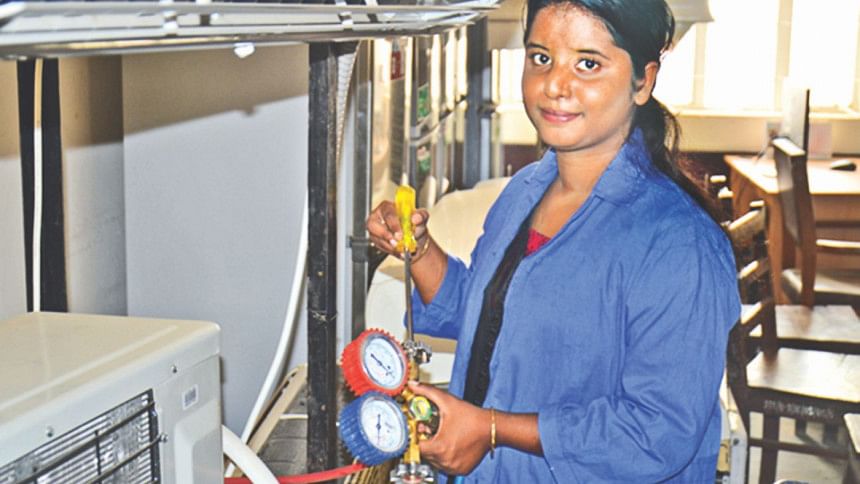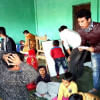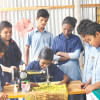Increasing women's access to skills and jobs

"My daughter and I were a burden on my parents," says 20-year-old Moushumi Akter Mou from Mirpur.
Married off at the age of 14, Mou could not complete her schooling. After her daughter was born, her husband remarried, leaving her feeling vulnerable and hopeless. "I felt that if I had a job, my life might be worthwhile."
These words are unfortunately common among young women in Bangladesh who, for no fault of their own, are often made to feel worthless and are unable to earn a living for themselves, thus denying them economic and social independence.
Around the world, women face challenges in joining the labour force. In Bangladesh, this is especially a challenge due to the double burden of patriarchy and poverty. One symptom of this problem is the low female participation rate in the Technical and Vocational Education and Training (TVET) sector, particularly in formal institutions. Women's participation in TVET in Bangladesh ranges from 9 to 13 percent in public institutions and 33 percent in private institutions. Only around one in five instructors in technical institutes is a woman.
Underprivileged Children's Education Programme (UCEP) Bangladesh, a leading vocational training institute, conducted a study recently to identify barriers preventing young women from accessing technical vocational training. The study identified multiple obstacles. Of the girls surveyed, 25 percent highlighted the lack of family support as the biggest barrier, followed by 21 percent who identified society's lack of acceptance. Also cited were concerns about safety at the workplace, insecurity travelling to and from work and the distance from training centres to home. Once enrolled, some girls dropped out. Of these, early marriage was the most common reason, accounting for more than half of the dropouts. Others cited health and family reasons. The study respondents were from urban locations. In rural locations, the factors may be even stronger.
Over the past decade the Government of Bangladesh has demonstrated a strong commitment to bringing women into the labour force. In March 2012, a National Skills Development Policy (NSDP) for Bangladesh, the development of which was supported by the International Labour Organisation (ILO), was approved. This policy recognises the low participation rates of women in skills development, and states that special efforts are necessary to correct this gender imbalance, particularly in the formal training system. It also proposes several measures such as promoting women's inclusion in "non-traditional" courses for better employment opportunities; social marketing and awareness raising; separate washrooms for women; and recruitment of female instructors wherever possible.
Subsequently, a National Strategy for Promoting Gender Equality has been formulated with ILO support. This has the explicit aim of increasing female participation in TVET through a comprehensive and holistic mix of social, economic, institutional and systemic transformational measures.
A strategic framework and objectives have been outlined with a clear set of priorities and targets. Objectives include increasing female enrolment by at least 25 percent, transforming mind sets and attitudes to eliminate negative perception towards "non-traditional skills" for women and establishing a gender responsive environment with appropriate support systems. ILO is working with the Ministry of Women and Children Affairs to ensure integration of the gender strategy in their annual plan, budget, and monitoring system and training institutions.
In addition to supporting the Government of Bangladesh in promoting gender equality in the skills system and TVET institutions, ILO's skills programme which in recent years has been funded by Canada and the European Union, is supporting hundreds of women like Mou in non-traditional occupations. These include carpentry, furniture making, hospitality (e.g. baker, chef, etc.) and food processing. Pilot initiatives in male dominated occupations and sectors help demonstrate ways in which the skills system can be made more gender equal.
As a result of the systemic changes taking place, Mou took up the challenge to learn a non-traditional trade in high demand. She is now a qualified refrigeration and air conditioning technician after having accessed training at UCEP Mirpur Technical School.
"My family members and others encouraged me to go for it. I took those remarks seriously and came to the refrigeration and AC technician trade to make a difference," she says.
In order to increase girls' participation in technical and vocational training programmes, efforts need to involve families, society, training providers, employers and government. Ambitious policies and action plans that succeed in transforming gender norms and relationships in society are required to bring about gender equality in the workplace, to create opportunities for more women like Mou.
The writer is Country Director of the International Labour Organisation (ILO), Bangladesh.

 For all latest news, follow The Daily Star's Google News channel.
For all latest news, follow The Daily Star's Google News channel. 








Comments